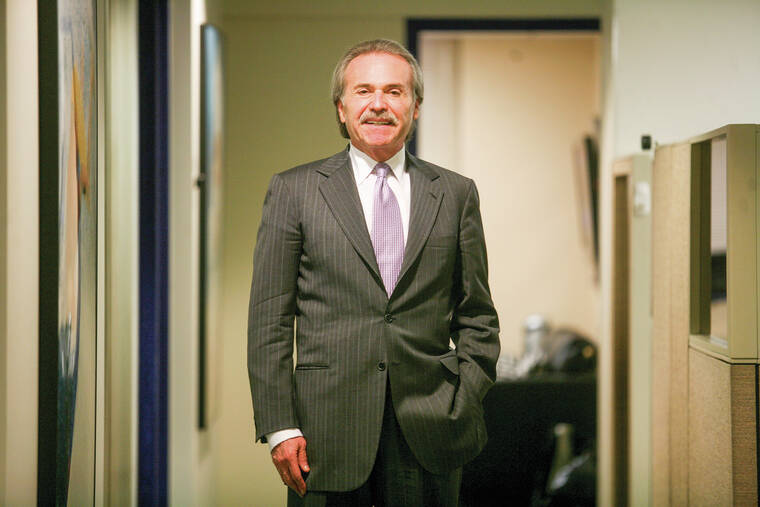Trump endures a rugged day in court as witness details ‘catch and kill’
NEW YORK — Donald Trump had a dismal day in court Tuesday as the judge presiding over his criminal trial told a defense lawyer he was “losing all credibility” and a key witness pulled back the curtain to expose what prosecutors called a conspiracy to influence the 2016 election.
The witness was David Pecker, longtime publisher of The National Enquirer, and he transported jurors back to a crucial 2015 meeting with Trump and his fixer at Trump Tower in midtown Manhattan.
ADVERTISING
Prosecutors called it the “Trump Tower conspiracy,” arguing that Pecker, Trump and Michael Cohen, who was then Trump’s personal lawyer and fixer, hatched a plot at the meeting to conceal sex scandals looming over Trump’s campaign.
Their effort led Pecker’s tabloids to buy and bury two damaging stories about Trump. Cohen also purchased the silence of a porn actor, a deal at the heart of the case against the former president.
In gripping and pivotal testimony Tuesday, Pecker recalled how Cohen and Trump asked what he and his magazines — fixtures of American supermarket checkout lanes — could do “to help the campaign.” The account bolstered the prosecution’s argument that the men were protecting not just Trump’s personal reputation, but his political fortunes.
“I would be your eyes and ears,” Pecker recalled telling them, as he explained the tabloid practice of “catch and kill,” in which an outlet bought the rights to a story, only to never publish it.
Pecker’s testimony came after a bruising hearing for Trump and his legal team, as prosecutors argued that the trial is threatened by Trump’s repeated attacks on witnesses and jurors, mostly launched on social media and his campaign website. They urged the judge, Juan M. Merchan, to hold Trump in contempt over what they said were 11 violations of a gag order that bars the former president from attacking witnesses, prosecutors, jurors and court staff, as well as their relatives.
When Trump’s lead lawyer, Todd Blanche, claimed that the former president was trying to comply with the order, Merchan signaled that he found that preposterous, replying with words that no lawyer wants to hear: “You’re losing all credibility with the court.”
The case against Trump, the first American president to face a criminal trial, centers on Cohen’s $130,000 hush-money payment to porn actor Stormy Daniels. Prosecutors say he paid Daniels at Trump’s direction during the 2016 campaign to keep her quiet about a sexual tryst she said she had with Trump.
Trump, 77, who faces up to four years behind bars, is charged with 34 counts of falsifying business records for the way in which he accounted for the $130,000 repayment to Cohen. Each count reflects a different false check, ledger and invoice that, according to prosecutors, Trump used to disguise the reimbursement’s true purpose.
The gag-order hearing, held with the jury out of the courtroom, demonstrated a jarring reality for Trump as he seeks to reclaim the White House while under indictment: His political reflexes, and the norm-busting ethos that has defined the Trump era, often clash with the letter of the law.
Witnesses in the case “rightly fear” being subjected to the former president’s “vitriol,” a prosecutor, Christopher Conroy, told the judge. He rattled off statements that Manhattan prosecutors believe crossed the line, including calling Cohen and Daniels “sleaze bags” and reposting an attack on the jury pool. That happened the night before a juror who had already been seated asked to be excused.
“What happened here was exactly what this order was meant to prevent, and the defendant doesn’t care,” Conroy said.
Trump’s lawyer, Todd Blanche, argued that Trump’s posts were not personal and did not violate the order, because he was simply responding to “a barrage of political attacks.”
But Merchan bridled, imploring Blanche to stick to the facts and the law.
“I need to know what is true,” Merchan said, underscoring Trump’s penchant for using social media to spread lies.
It then got worse for Blanche, who appeared flummoxed by the judge. At one point, Merchan called one of his arguments “silly.”
Prosecutors have asked Merchan to fine Trump $1,000 for each statement, although Conroy wondered aloud if Trump, who has sold campaign merchandise with his mug shot, was actually angling for jail time. The judge, whose daughter has been among Trump’s targets, did not immediately rule.
In about 2 1/2 hours of examining Pecker on Tuesday, the prosecution placed him firmly in Trump’s orbit, as a longtime fan and friend who became an extension of the 2016 Trump campaign. His closeness to Trump — and his gentle, almost grandfatherly affect — appeared to bolster his credibility.
“I would call him Donald,” Pecker recalled, adding that he had “a great relationship with Mr. Trump over the years” and that he had launched a magazine with him called “Trump Style.”
Pecker described a symbiotic relationship between Trump and The National Enquirer during the former president’s turn as a reality television host on “The Apprentice.” Trump would leak details of the show to the magazine, which in turn would run stories on the contestants.
The relationship took on national significance after the crucial 2015 meeting at Trump Tower.
“I received a call from Michael Cohen telling me that the boss wanted to see me,” Pecker recounted for the jury.
Afterward, Cohen routinely contacted Pecker, checking in weekly or even daily. The purpose of their conversations was often was to protect Trump from negative stories, including a door attendant’s apparently false claim that Trump had fathered a child out of wedlock. Pecker, who purchased the story, testified that Cohen had told him “the boss would be very pleased” to have that story suppressed.
© 2024 The New York Times Company





